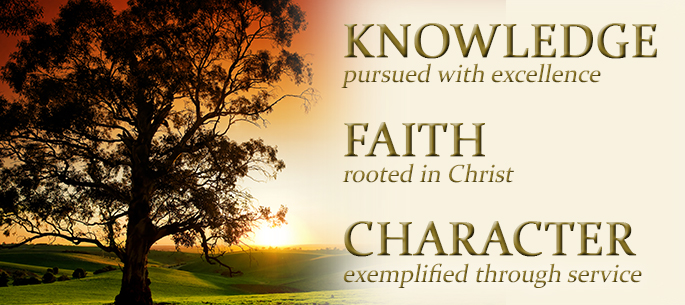Educational Philosophy
PHILOSOPHY OF THE CHRISTIAN SCHOOL:
Christian education begins with the premise that all truth is God’s truth. God has revealed the truth about Himself in the scriptures. We discover truth about His creation as we diligently study the natural world and the intangible truths within creation. A high quality, rigorous curriculum is provided with a sense of high expectations, in order to encourage the students to develop their God-given gifts to the fullest. The curriculum is supplemented with many extra-curricular activities such as fine arts, choir, band, drama, computer, athletics, etc. All three of these institutions (home, church and school) should be consistent in their philosophy and what they teach. Deuteronomy 6:5-7 makes it clear that the truths of God should not only be taught at home but also wherever the child goes.
PHILOSOPHY OF THE FACULTY:
It is only through the teaching of born-again Christians that spiritual morals can be taught. If the greatest need of man is redemption, then redeemed people need to be teaching it. An unredeemed person obviously does not see the need of a Savior. According to Matthew 28, it is the Christian teacher who is given all authority to teach the Truths of the Word. It is key that this teaching be consistent with the Word of God. In order for this to occur, the work of the Holy Spirit must be acknowledged. A teacher must be in communion with Christ in order to relay the Truths to the students. It is a fact that is inescapable; the world view of the teacher, in so far as he is effective, gradually conditions the world view of the pupil. It is vital that a teacher have a Christian worldview. The gift of teaching requires the teacher to tell others about the Bible and then to live the contents of the Bible in his/her life for others to see. Because of these facts, we only employ born again teachers with the same philosophy as Friendship Baptist Church.
PHILOSOPHY OF THE CURRICULUM:
The goals of curriculum will be put into four categories: Word-centered, Bible-integrated, pupil-related and socially-applied.
• Word-centered -The foundation of curriculum must be the Word of God. The Written Word (Bible) and the Living Word (Jesus Christ) must be brought together in order to lead students to develop Christian maturity. By knowing that all truth is God’s truth, we have the authority to speak the truth in all classes.
• Bible-integrated – We must apply Biblical principles to every area of the curriculum. In order to develop the whole student, we must make the Bible relate to every area of one’s life.
• Pupil-related – The goal has to be that a student will develop to one’s fullest potential in one’s walk with Christ. This goal is based on the following facts. 1) Each student is a specially, created individual uniquely made in God’s image and needs to be taught as such. 2) We must provide nurturing for each child to become all that God intended for that child. 3) Each student develops at a different level and we need to reach each one’s needs at his/her level. 4) Our methods need to reflect these unique learning processes and have a variety that will reach each student.
• Socially-applied – Our curriculum needs to look at world, national, and community needs and problems and be able to make them relevant to the students.
